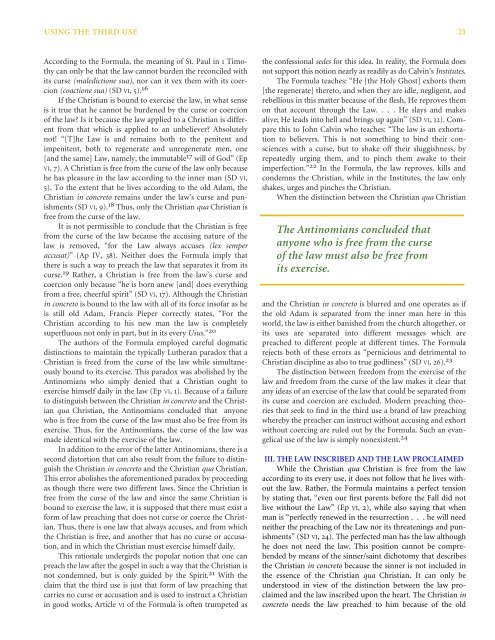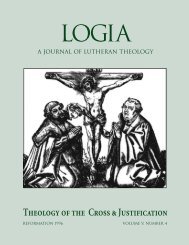03-1 Pastoral Care.pdf
03-1 Pastoral Care.pdf
03-1 Pastoral Care.pdf
- No tags were found...
Create successful ePaper yourself
Turn your PDF publications into a flip-book with our unique Google optimized e-Paper software.
USING THE THIRD USE 21According to the Formula, the meaning of St. Paul in 1 Timothycan only be that the law cannot burden the reconciled withits curse (maledictione sua), nor can it vex them with its coercion(coactione sua) (SD VI, 5). 16If the Christian is bound to exercise the law, in what senseis it true that he cannot be burdened by the curse or coercionof the law? Is it because the law applied to a Christian is differentfrom that which is applied to an unbeliever? Absolutelynot! “[T]he Law is and remains both to the penitent andimpenitent, both to regenerate and unregenerate men, one[and the same] Law, namely, the immutable 17 will of God” (EpVI, 7). A Christian is free from the curse of the law only becausehe has pleasure in the law according to the inner man (SD VI,5). To the extent that he lives according to the old Adam, theChristian in concreto remains under the law’s curse and punishments(SD VI, 9). 18 Thus, only the Christian qua Christian isfree from the curse of the law.It is not permissible to conclude that the Christian is freefrom the curse of the law because the accusing nature of thelaw is removed, “for the Law always accuses (lex semperaccusat)” (Ap IV, 38). Neither does the Formula imply thatthere is such a way to preach the law that separates it from itscurse. 19 Rather, a Christian is free from the law’s curse andcoercion only because “he is born anew [and] does everythingfrom a free, cheerful spirit” (SD VI, 17). Although the Christianin concreto is bound to the law with all of its force insofar as heis still old Adam, Francis Pieper correctly states, “For theChristian according to his new man the law is completelysuperfluous not only in part, but in its every Usus.” 20The authors of the Formula employed careful dogmaticdistinctions to maintain the typically Lutheran paradox that aChristian is freed from the curse of the law while simultaneouslybound to its exercise. This paradox was abolished by theAntinomians who simply denied that a Christian ought toexercise himself daily in the law (Ep VI, 1). Because of a failureto distinguish between the Christian in concreto and the Christianqua Christian, the Antinomians concluded that anyonewho is free from the curse of the law must also be free from itsexercise. Thus, for the Antinomians, the curse of the law wasmade identical with the exercise of the law.In addition to the error of the latter Antinomians, there is asecond distortion that can also result from the failure to distinguishthe Christian in concreto and the Christian qua Christian.This error abolishes the aforementioned paradox by proceedingas though there were two different laws. Since the Christian isfree from the curse of the law and since the same Christian isbound to exercise the law, it is supposed that there must exist aform of law preaching that does not curse or coerce the Christian.Thus, there is one law that always accuses, and from whichthe Christian is free, and another that has no curse or accusation,and in which the Christian must exercise himself daily.This rationale undergirds the popular notion that one canpreach the law after the gospel in such a way that the Christian isnot condemned, but is only guided by the Spirit. 21 With theclaim that the third use is just that form of law preaching thatcarries no curse or accusation and is used to instruct a Christianin good works, Article VI of the Formula is often trumpeted asthe confessional sedes for this idea. In reality, the Formula doesnot support this notion nearly as readily as do Calvin’s Institutes.The Formula teaches: “He [the Holy Ghost] exhorts them[the regenerate] thereto, and when they are idle, negligent, andrebellious in this matter because of the flesh, He reproves themon that account through the Law. . . . He slays and makesalive; He leads into hell and brings up again” (SD VI, 12). Comparethis to John Calvin who teaches: “The law is an exhortationto believers. This is not something to bind their conscienceswith a curse, but to shake off their sluggishness, byrepeatedly urging them, and to pinch them awake to theirimperfection.” 22 In the Formula, the law reproves, kills andcondemns the Christian, while in the Institutes, the law onlyshakes, urges and pinches the Christian.When the distinction between the Christian qua ChristianThe Antinomians concluded thatanyone who is free from the curseof the law must also be free fromits exercise.and the Christian in concreto is blurred and one operates as ifthe old Adam is separated from the inner man here in thisworld, the law is either banished from the church altogether, orits uses are separated into different messages which arepreached to different people at different times. The Formularejects both of these errors as “pernicious and detrimental toChristian discipline as also to true godliness” (SD VI, 26). 23The distinction between freedom from the exercise of thelaw and freedom from the curse of the law makes it clear thatany ideas of an exercise of the law that could be separated fromits curse and coercion are excluded. Modern preaching theoriesthat seek to find in the third use a brand of law preachingwhereby the preacher can instruct without accusing and exhortwithout coercing are ruled out by the Formula. Such an evangelicaluse of the law is simply nonexistent. 24III. THE LAW INSCRIBED AND THE LAW PROCLAIMEDWhile the Christian qua Christian is free from the lawaccording to its every use, it does not follow that he lives withoutthe law. Rather, the Formula maintains a perfect tensionby stating that, “even our first parents before the Fall did notlive without the Law” (Ep VI, 2), while also saying that whenman is “perfectly renewed in the resurrection . . . he will needneither the preaching of the Law nor its threatenings and punishments”(SD VI, 24). The perfected man has the law althoughhe does not need the law. This position cannot be comprehendedby means of the sinner/saint dichotomy that describesthe Christian in concreto because the sinner is not included inthe essence of the Christian qua Christian. It can only beunderstood in view of the distinction between the law proclaimedand the law inscribed upon the heart. The Christian inconcreto needs the law preached to him because of the old
















